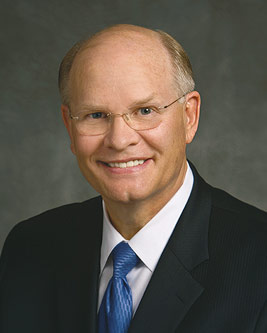Improvement
SEARCH BY TITLE
 Latter-day Saints Keep on Trying
Latter-day Saints Keep on Trying
My dear brothers and sisters, in December 2013 the world mourned the death of Nelson Mandela. After 27 years of imprisonment for his role in the antiapartheid struggle, Mandela was the first democratically elected president of South Africa. His forgiveness of those who had imprisoned him was remarkable. He received widespread acclaim and praise. Mandela frequently deflected accolades by saying, “I’m no saint—that is, unless you think a saint is a sinner who keeps on trying.” This statement—“a saint is a sinner who keeps on trying”—should reassure and encourage members of the Church. Although we are referred to as “Latter-day Saints,” we sometimes flinch at this reference. The term Saints is commonly used to designate those who have achieved an elevated state of holiness or even perfection. And we know perfectly well that we are not perfect. Our theology does teach us, though, that we may be perfected by repeatedly and iteratively “relying wholly upon” the doctrine of Christ: exercising faith in Him, repenting, partaking of the sacrament to renew the covenants and blessings of baptism, and receiving the Holy Ghost as a constant companion to a greater degree. As we do so, we become more like Christ and are able to endure to the end, with all that that entails. In less formal terms, God cares a lot more about who we are and who we are becoming than about who we once were. He cares that we keep on trying. The comedy As You Like It, written by the English playwright William Shakespeare, depicts a dramatic change in a character’s life. An older brother attempts to have his younger brother killed. Even knowing this, the younger brother saves his wicked brother from certain death. When the older brother learns of this undeserved compassion, he is totally and forever changed and has what he calls a “conversion.” Later several women approach the older brother and ask, “Was’t you that did so oft contrive to kill [your brother]?” The older brother answers, “’Twas I; but ’tis not I: I do not shame to tell you what I was, since my conversion so sweetly tastes, being the thing I am.” For us, because of God’s mercy and the Atonement of Jesus Christ, such a change is not just literary fiction.
 “Lord, Is It I?”
“Lord, Is It I?”
Over the course of my life, I have had the opportunity to rub shoulders with some of the most competent and intelligent men and women this world has to offer. When I was younger, I was impressed by those who were educated, accomplished, successful, and applauded by the world. But over the years, I have come to the realization that I am far more impressed by those wonderful and blessed souls who are truly good and without guile. And isn’t that what the gospel is all about and does for us? It is the good news, and it helps us to become good. The words of the Apostle James apply to us today: “God resisteth the proud, but giveth grace unto the humble. …“Humble yourselves in the sight of the Lord, and he shall lift you up.” Brethren, we must put aside our pride, see beyond our vanity, and in humility ask, “Lord, is it I?” And if the Lord’s answer happens to be “Yes, my son, there are things you must improve, things I can help you to overcome,” I pray that we will accept this answer, humbly acknowledge our sins and shortcomings, and then change our ways by becoming better husbands, better fathers, better sons. May we from this time forward seek with all our might to walk steadfastly in the Savior’s blessed way—for seeing ourselves clearly is the beginning of wisdom. As we do so, our bountiful God will lead us by the hand; we will “be made strong, and blessed from on high.” My beloved friends, a first step on this wondrous and fulfilling path of true discipleship starts with our asking the simple question: “Lord, is it I?”
